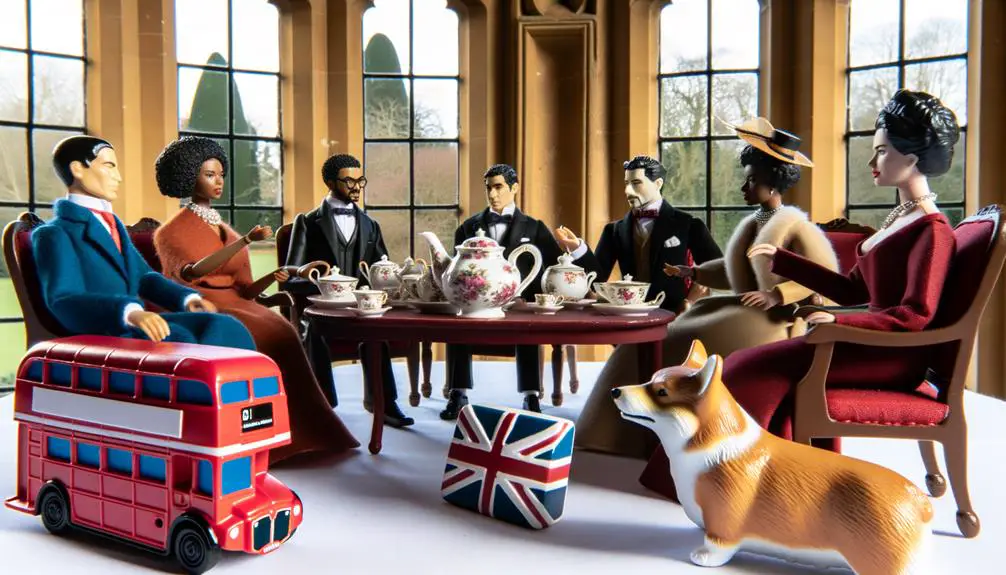Posh British slang represents a refined layer of communication used mainly amidst the upper echelons of society. This vernacular distinguishes itself through nuanced expressions and idiomatic subtleties, reflective of social standing and long-standing traditions. You encounter a complex system of elite euphemisms and colloquialisms that articulate not only class distinctions but also a discreet allegiance to a sophisticated, historical social hierarchy. These expressions embed themselves in daily high society engagements, from tea etiquette to dress codes, signaling an artful mastery over the lexicon necessary for traversing social landscapes. Decoding this linguistic intricacy offers insights into the interplay between language, power, and social stratification. Engaging further, you uncover deeper layers of this aristocratic discourse.
Decoding the Upper Crust
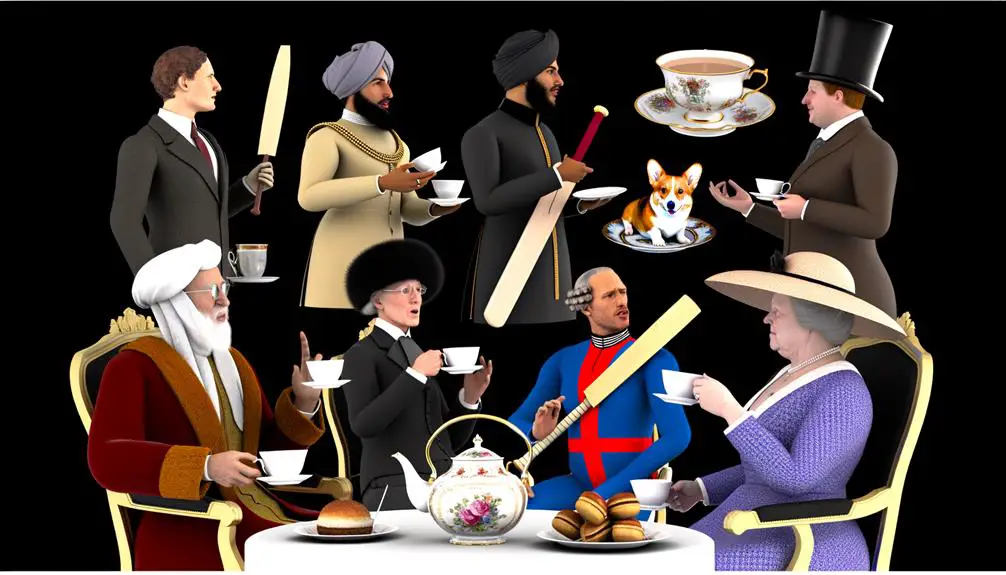
To truly understand the intricacies of British slang, it's essential to explore the linguistic habits of the upper crust, where tradition and exclusivity mold a distinct vernacular. This exploration delves into the domain of royal dialects, a cornerstone of cultural linguistics that offers insight into the socio-economic stratifications within the UK. Royal dialects, often epitomized by the Queen's English, aren't merely about pronunciation but also encompass a lexicon steeped in history and tradition.
You'll find that this elite vernacular serves as a marker of identity and belonging, distinguishing the upper echelons from other social strata through linguistic subtleties. The adoption of certain phrases and the eschewal of others aren't random but are deeply embedded in the cultural fabric of the British aristocracy.
Understanding these linguistic nuances requires an analytical approach, where you dissect the layers of meaning and historical context behind each term. It's a linguistic journey that reveals how power, privilege, and heritage have shaped, and continue to influence, the way English is spoken by the UK's upper crust. This exploration into royal dialects and cultural linguistics not only enriches your understanding of British slang but also illuminates the complex interplay between language, class, and culture in Britain.
Quintessentially British Expressions
Exploring the world of quintessentially British expressions, you'll encounter a linguistic treasure trove that encapsulates the nation's identity, humor, and history. Dive into the domain of tea terminology, where phrases like 'builder's tea' denote a strong brew, traditionally enjoyed by laborers. This term not only highlights the British penchant for tea but also reflects a broader class-conscious dialogue within the language. Similarly, 'tea time' transcends a mere meal slot, symbolizing a moment for pause, reflection, or socialization, thereby illustrating the beverage's integral role in British societal norms.
Venturing into pub lingo, you're introduced to expressions that serve as the backbone of British social life. Terms like 'pub grub' refer to the hearty, often traditional, food served in pubs, underscoring the establishment's dual role as a place for both drinking and dining. The phrase 'round' is pivotal, denoting the communal act of buying a group of people drinks in turns, a practice steeped in notions of fairness and camaraderie. Through these expressions, you gain insights into the values of community and social etiquette that pervade British culture.
These quintessentially British expressions, rich in cultural nuances, offer a window into the nation's character, revealing an intricate blend of tradition, class consciousness, and social rituals.
Navigating High Society Lingo
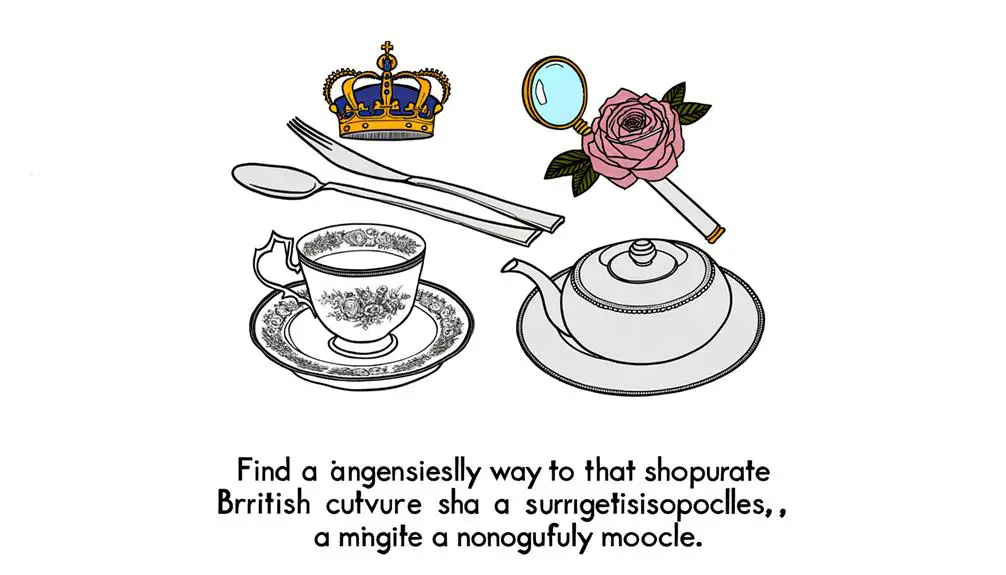
As you commence on understanding high society lingo, it's vital to recognize that deciphering elite vernacular involves more than simply translating words; it requires an appreciation for the nuanced contexts in which these terms are employed.
The lexicon associated with social etiquette, for instance, serves not only as a means of communication but also as a marker of one's social standing and familiarity with upper-class norms.
This exploration allows you to grasp the subtle yet significant distinctions that define communication within British high society.
Deciphering Elite Vernacular
Traversing the intricate tapestry of elite vernacular requires an understanding of its nuanced expressions and idiomatic subtleties, often reflecting both historical influences and contemporary trends within high society. The evolution of slang within this echelon not only mirrors shifts in cultural norms but also underscores the cultural implications of language as a marker of social identity. To grasp this dialect is to navigate a world where language serves as both a barrier and a bridge.
| Term | Meaning |
|---|---|
| "Poppycock" | Nonsense |
| "Old Bean" | Term of endearment for a man |
| "Blighty" | Britain |
| "Skint" | Lacking money |
| "Gaff" | Home or place of residence |
Understanding these terms offers a glimpse into the lexicon of the elite, revealing the layered complexity of social interactions and the ever-evolving landscape of British high society vernacular.
Social Etiquette Lexicon
Building on our understanding of elite vernacular, let's now focus on the specific lexicon of social etiquette to traverse high society lingo effectively. A pivotal component is tea etiquette, a ceremonious tradition rich in its own jargon. Mastering terms like 'milk in first' (MIF) or 'tea before milk' (TBM) isn't just about preference but signals one's familiarity with upper-class customs.
Equally important are the dress codes, which are often cryptic yet precise. Understanding the subtle differences between 'black tie' and 'white tie' events, or what 'smart casual' truly entails, requires a nuanced comprehension of sartorial expressions. These codes aren't merely about attire but communicate respect, intention, and social standing.
Mastery over this lexicon is essential for adeptly traversing the complex social landscapes of high society.
The Charm of Aristocratic Vernacular
Exploring the allure of aristocratic vernacular reveals a unique linguistic tapestry, woven from centuries of history, culture, and social stratification, inviting you to investigate its nuanced layers. The cultural origins of this vernacular trace back to a time when language was not just a means of communication but a marker of class and social standing. As you dig deeper, you'll find that the evolution of slang within the aristocracy wasn't merely for exclusivity but served as a dynamic reflection of changing times, attitudes, and influences.
To make this exploration more relatable, consider the following table that briefly illustrates the evolution and charm of aristocratic slang:
| Era | Slang Example | Context |
|---|---|---|
| 18th Century | 'Macaroni' | Fashion-forward individuals, often ridiculed |
| 19th Century | 'Bang up to the elephant' | Excellent or first-rate |
| Early 20th Century | 'Plummy' | Describing a particularly posh accent |
| Contemporary | 'Toff' | A derogatory term for an aristocrat |
This table underscores the dynamic nature of slang evolution within the aristocracy, reflecting broader socio-cultural shifts. As you explore this vernacular's charm, you're not just learning about words but about the intricate web of history, culture, and social nuances that have shaped it.
Elite Euphemisms and Idioms
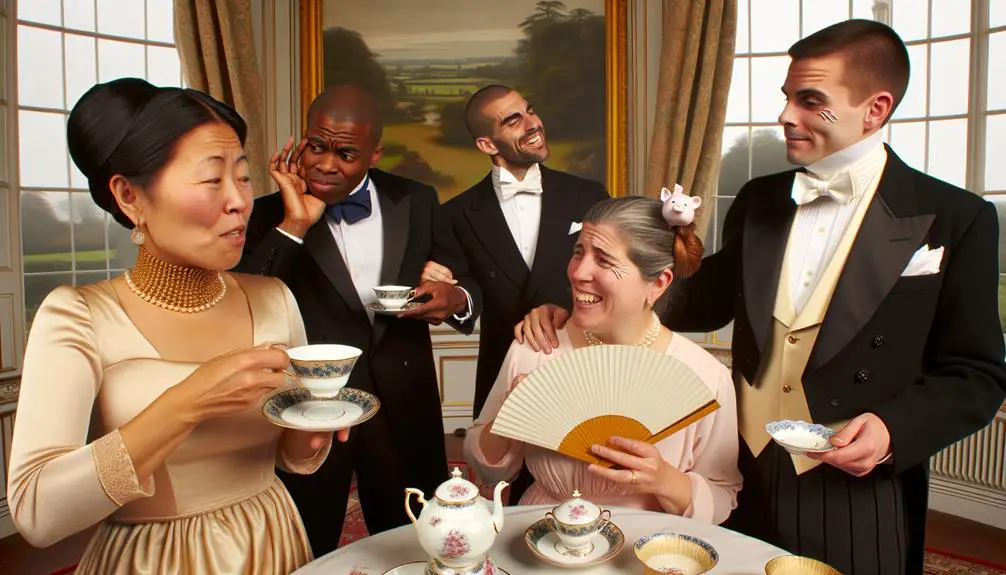
You'll find that elite euphemisms and idioms, embodying quirky aristocratic expressions, high society linguistics, and classy colloquialisms, serve not only as a linguistic badge of social status but also as a complex system of communication within British elite circles.
These linguistic nuances offer insight into the subtleties of power, exclusivity, and tradition that pervade the upper echelons of British society.
Analyzing these expressions reveals the intricate ways in which language can both reflect and perpetuate class distinctions.
Quirky Aristocratic Expressions
Delving into the world of British aristocracy reveals a plethora of quirky expressions, elite euphemisms, and idioms that encapsulate their unique cultural nuances. This genteel gibberish and noble natter serve not just as a means of communication but as a marker of social status and identity.
You'll find that these expressions often disguise the mundane under layers of complexity and tradition, turning everyday conversation into an art form. The intricacies of their usage require a deep understanding of context, history, and social hierarchies.
Analyzing these phrases offers insight into the values, priorities, and humor of the upper echelons of British society. Such linguistic practices underscore the aristocracy's penchant for subtlety, wit, and a distinct form of verbal elegance.
High Society Linguistics
Exploring the domain of upper-class linguistics reveals a mesmerizing landscape of elite euphemisms and idioms. Here, language not only communicates but also delineates social boundaries and conveys subtle nuances of privilege and breeding.
Within this domain, royal dialects offer a fascinating study in cultural linguistics, showcasing how language functions as a marker of social status. These dialects and idioms aren't merely about vocabulary but embody a thorough cultural code that includes pronunciation, rhythm, and even the choice of topics considered appropriate for conversation.
This linguistic stratification reinforces the exclusivity of high society, ensuring that those within its ranks can instantly recognize one another, while subtly excluding outsiders. The study of these linguistic practices provides insights into the complex interplay between language, power, and social hierarchy.
Classy Colloquialisms Unveiled
Expanding on the examination of high society linguistics, this section reveals the world of elite euphemisms and idioms, demonstrating how these sophisticated colloquialisms serve not only as a linguistic badge of exclusivity but also as a subtle means of social navigation and distinction. You'll discover the intricate balance between verbal elegance and coded messaging, where slang origins play a pivotal role in shaping the cultural impact of these expressions. The table below exemplifies this dynamic interplay:
| Phrase | Meaning | Context |
|---|---|---|
| "Old Bean" | A term of endearment | Friendly |
| "Rather" | Very, to a great extent | Emphasis |
| "Poppycock" | Nonsense | Dismissal |
| "Tickety-boo" | Everything is fine | Reassurance |
| "Toff" | Wealthy person | Class Distinction |
This exploration into posh British slang uncovers the layers of social stratification and identity within the fabric of English language.
From Oxford to Chelsea: Slang Unveiled
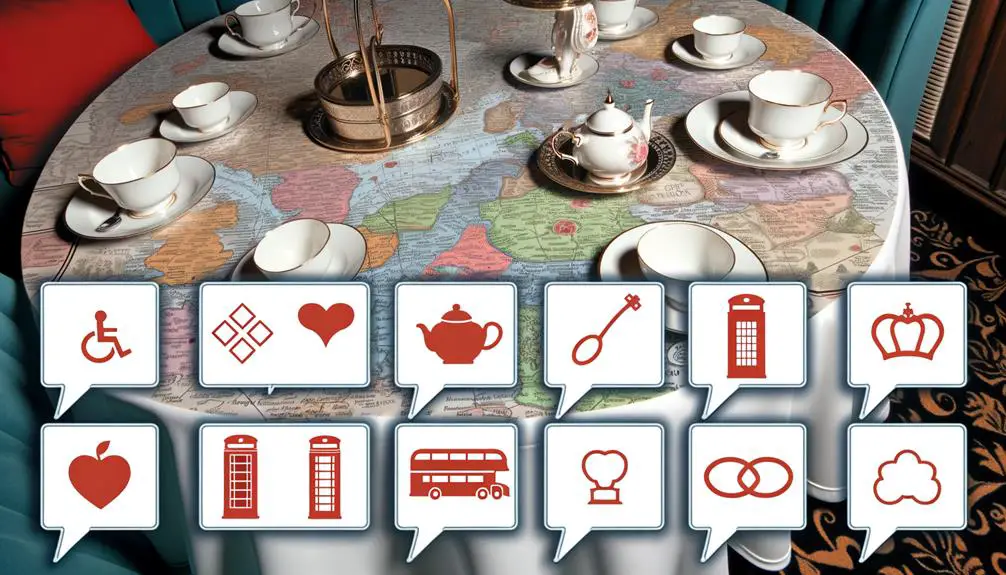
From Oxford to Chelsea, you'll encounter a rich tapestry of slang that serves as a mirror to the diverse linguistic landscapes of these areas. This phenomenon, deeply rooted in historical and social contexts, showcases how language evolves over time. Specifically, the Cockney influence and regional dialects have played pivotal roles in shaping the vernacular.
In Oxford, you're likely to stumble upon a more refined lexicon, a reflection of its academic heritage. Words are chosen with precision, often drawing from Latin or Greek roots, indicating a scholarly influence that permeates even casual conversations.
Conversely, in Chelsea, the language takes on a more cosmopolitan flair, integrating elements from various cultures. Here, slang isn't merely a means of communication but a statement of identity and social standing. Despite these differences, both locales demonstrate the dynamic nature of language, where regional dialects contribute to a rich, evolving vernacular.
The interplay between the Cockney influence and the distinct dialects of each area highlights the complexity of British slang. It's a linguistic journey that reveals much about the cultural and social underpinnings of each place, inviting you to explore further into the nuances of British English.
Frequently Asked Questions
How Has Posh British Slang Evolved in the Digital Age, Particularly With the Influence of Social Media and Online Communication?
In the digital age, you've seen digital dialects and slang globalization reshape communication. Online platforms have accelerated the evolution of language, blending traditional elements with new expressions, reshaping how you understand and use slang today.
Are There Any Notable Differences in the Use of Posh Slang Between Various Regions of the Uk, Such as Scotland Vs. England?
Yes, you'll find notable regional differences in posh slang usage across the UK, shaped by cultural origins and accent influence. Scotland and England, for example, display distinct variations reflective of their unique cultural backgrounds.
How Do Younger Generations of the British Upper Class Feel About the Traditional Slang Terms? Are They Adopting New Phrases or Sticking to the Classics?
You're witnessing a fascinating shift where younger members of the British upper class navigate their language identity. There's a clear generational divide, as they blend traditional slang with modern phrases, reshaping their linguistic heritage.
Can Understanding and Using Posh British Slang Impact an Outsider's Acceptance Into Upper-Class Social Circles, or Is It Viewed as Inauthentic?
Understanding posh British slang can aid in cultural adaptation, enhancing your acceptance in upper-class circles. However, language authenticity is key; if it's perceived as inauthentic, you're less likely to be embraced by those groups.
How Has Popular Culture, Especially Television and Movies Focused on the British Aristocracy, Affected the Global Understanding and Usage of Posh British Slang?
Popular culture, through TV and movies, has shaped global perceptions of British aristocracy, leading to the appropriation of language and reinforcing cultural stereotypes. You're witnessing an academic analysis of how media influences language use worldwide.
Conclusion
Exploring the labyrinthine corridors of posh British slang is like beginning an archaeological dig into the heart of British culture. Each idiom and euphemism you uncover sheds light on the intricate tapestries of class, tradition, and social ballet that define the upper echelons.
As you decipher the vernacular of the elite, from Oxford to Chelsea, you're not just acquiring words; you're gaining insight into a world where language is both shield and sword, meticulously crafted to convey belonging or exclusion.

